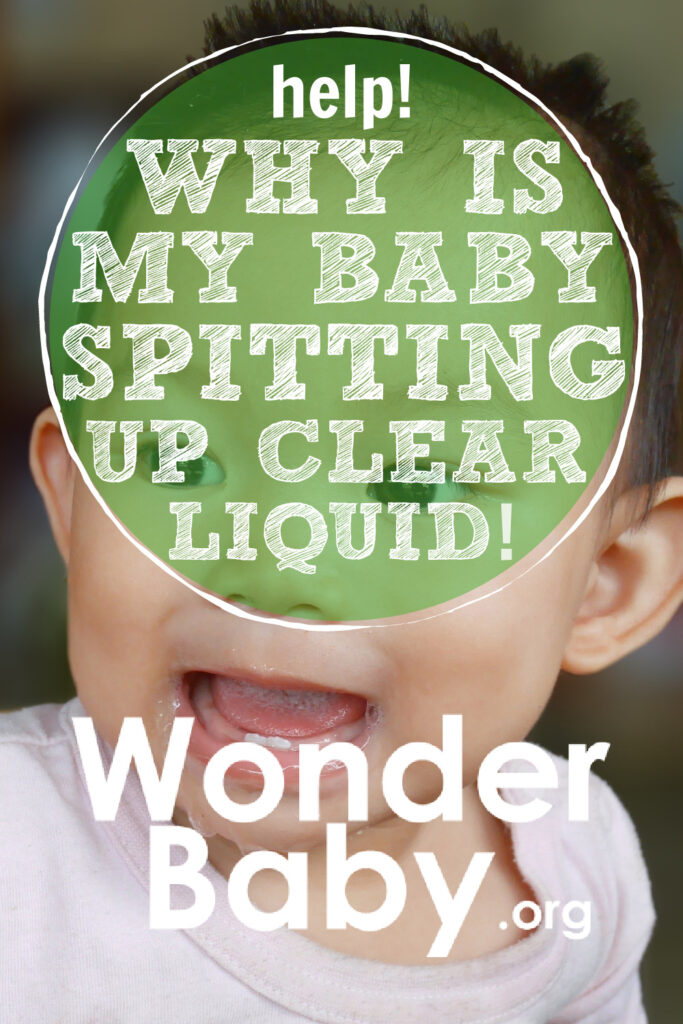Help! Why Is My Baby Spitting up Clear Liquid!

- Spitting up is very common for young children under 12 months of age.
- Spitting up is rarely a sign of a medical emergency.
- Most children will outgrow spitting up by 12 months.
- Spitting up clear liquid is rarely something to be worried about.
- Feeding less and keeping the baby upright are easy ways to limit spitting up.
If you’re new to parenting, it’s not entirely shocking how messy babies can sometimes get. My three kids have offered us more surprises from both ends than I care to think about.
During my time working as an RN, I’ve seen many children come to the hospital for spitting up and vomiting. Most of these kids turned out to be okay.
More often than not, something like spitting up isn’t a big deal. Your baby may spit up a little after feeding, for example, but all is well. There are other times when babies experience something more like vomiting. When we get concerned about kids in these scenarios, there is often more to the story, like a fever.
At some point you may have asked yourself, why is my baby spitting up clear liquid? Knowing some basic information may help put your mind at ease.
Baby Spit Up vs Vomit: How to Tell the Difference
Spitting up and vomiting can seem similar if you’re unfamiliar with the topic. Some people may consider these the same thing, but they’re not. The difference between spitting up and vomiting comes down to how much effort your baby’s body is putting into what’s happening. Spitting up for many young kids just happens; vomiting has a purpose.
Spitting Up in Babies
Spitting up comes from the passive movement of what’s in the baby’s stomach back up the tube that connects the stomach to the mouth. It then comes out of the mouth or nose where we can see it.
By passive movement, we mean it happens without the body trying to do it. The body isn’t trying to get anything out. Because of something like the baby’s position or maybe a burp, food comes up.
It may make more sense if we relate it to something we sometimes experience as adults. Have you ever burped, maybe a little too aggressively, and suddenly you taste… well, you know. The classic Vurp—an unpleasant experience paired well with the strange look on our faces as it takes us by surprise.
In this case, what we experience as adults is pretty close to what babies experience when they spit up. Nothing is wrong with us, and our body isn’t trying to empty our stomachs. When a baby spits up, it is very likely there is nothing wrong with the baby either.
Babies most often spit up because the muscles of a baby’s digestive system still need time to mature and become stronger.
The lower esophageal sphincter sits at the top of the stomach and acts like a gatekeeper. It tries to keep everything moving in the right direction. Sometimes that sphincter is not strong enough, and it lets things come up, causing the baby to spit up.
This situation of food coming up and out of the baby’s stomach into the esophagus is common. It’s even got a name: gastroesophageal reflux. It may also be referred to as infant reflux or infant acid reflux.
Gastroesophageal reflux (GER) is when food contents travel up from the stomach to the mouth and nose. This is how the National Institutes for Health defines GER.
This may sound familiar to what we know as adults when we hear about gastroesophageal reflux disease (GERD). This is a more chronic, longer-lasting problem leading to more complications.
It is important to know that gastroesophageal reflux is not the same thing as gastroesophageal reflux disease (GERD).

Vomiting in Babies
Vomiting is a much more forceful movement of food from the stomach up and out of the body. Think of it as the baby’s body trying to get whatever is in the stomach out quickly.
Maybe the baby has some type of illness, or maybe there is something wrong with what they ate. The body recognizes this and wants whatever is in there out ASAP.
Because vomiting is happening with more force, things are going to look different than if the baby spits up. For example:
- There is likely going to be more coming out compared to if the baby spits up.
- Whatever comes out is likely going to travel farther up and out of the baby’s mouth.
- When vomiting, there will be more obvious body movements like muscle contractions.
- The baby will likely appear uncomfortable, maybe crying or needing to be consoled.
When vomiting, there are often other symptoms that you may notice. These symptoms could include fever, changes in the baby’s stools, not wanting to feed, or they may seem more sleepy than normal. These other symptoms can occur from whatever illness or condition is causing the vomiting or not being able to keep down food.
Frequent vomiting can cause dehydration in young children. If this happens you should seek immediate medical attention.
Is It Normal for Babies to Spit Up Clear Liquid?
Generally speaking, spitting up is very common for young children and is not likely a sign that anything is wrong with your baby. Spitting up clear liquid is also often normal and not likely something you should be worried about.
If your baby is spitting up clear liquid, that means what they are spitting up does not likely contain food or anything of any nutritional value. This is great because it means they’re not losing anything that they really need.
Will My Baby Outgrow Spitting Up?
Yes, according to the Mayo Clinic it is very likely that your baby will outgrow spitting up by about 12 months old. Spitting up is caused by muscles that haven’t fully developed and allow food to move from the stomach back up to the nose and mouth.
As your baby gets older, the muscles of the stomach and the esophagus muscles will strengthen. This will keep everything in the stomach where it should be.
Common Reasons Why Babies Spit Up Clear Liquid
Spitting up clear fluid is good in a way because it means there isn’t much food in what’s coming out. Some of the reasons babies spit up clear fluid are related to things familiar to many of us.
Teething and Drooling
Many babies drool, some much more than others. Drooling can become even more noticeable when teething, for example, as the number of daily wardrobe changes skyrockets from so much more saliva. Excess saliva that doesn’t come out of their mouth onto whatever happens to catch it gets swallowed.
When babies swallow a large amount of saliva from their mouth, it can become noticeable when they spit it back up as a clear liquid.
Illness and Congestion
Babies have an immature immune system. This can put them at risk for things like viruses that can cause respiratory illnesses. Some of these illnesses can come with cold-like symptoms causing congestion and secretions in their noses.
Similar to the buildup of saliva that babies can swallow when teething, they’re also not very good at doing anything else with the secretions in their noses. They often end up swallowing that too.
Secretions from the nose and mouth are swallowed, ending up in the stomach. As we just learned when babies spit up, the stomach’s contents are allowed to travel out of their stomach and back up into their mouths.
When saliva or other secretions that were swallowed are allowed to come back up it may look like they’re spitting up clear liquid.

When to Worry About Your Baby Spitting Up Clear Liquids
We’ve spent a lot of time talking about how spitting up clear liquids is only sometimes something to be concerned about. However, some conditions require immediate medical attention.
Pyloric stenosis is a problem that can cause a baby to spit up or vomit. It will not correct itself on its own and is not something your baby can grow out of.
Pyloric stenosis is when the opening from the stomach to the intestines is too narrow to let food pass by. When the contents of the stomach build up too much it comes right back out.
More reasons to seek immediate medical attention when your baby spits up:
- The fluid changes from clear to yellow or green.
- Your baby doesn’t seem to want to eat.
- There are signs your baby may be dehydrated like less wet diapers.
- Your baby seems like they’re not gaining weight, or losing weight.
- There are other signs of illness like fever.
- There is blood in what they’re spitting up.
- Your baby seems hard to console.
Tips to Help Prevent Your Baby From Spitting Up
As you probably noticed by now, spitting up for babies most often isn’t such a big deal. It can however be unpleasant for all those involved and is worth trying to limit. This can be done through some basic changes in your routine.
Don’t Overfeed
If your baby seems to spit up a lot after feeding try to feed smaller amounts. Babies have very small stomachs and it could be that they’re taking in too much milk.
As their stomach fills up the pressure builds. With weaker muscles to keep everything down, feeding less can possibly limit how much they will spit up.
Burp More
While babies are feeding they are also sometimes taking in air. The air they swallow can take up some valuable space in the stomach and adds to the build-up of pressure. The pressure can cause them to spit up.
Burping more often while feeding can relieve some of the pressure making them less likely to spit up.
Upright Position
Feed the baby in a more upright position and keep them upright for about 30 minutes after feeding. This will also reduce the pressure on a full stomach.
Pause the Playtime
I’m pretty sure none of us would want to be bounced around with a full belly. Limiting the activity after feeding will help keep everything in the stomach where it should be.
Back to Sleep
Putting the baby on their back to sleep may help them spit up less by also reducing the pressure on their stomach. Sleeping on their back is also a key recommendation by the Centers for Disease Control (CDC) in the prevention of sudden infant death syndrome (SIDS).
Change Your Diet
For breastfeeding mothers, some dietary characteristics can end up influencing their breast milk. If you find your baby spitting up often, consider the idea that it may be something in your breast milk that isn’t sitting well with the baby.

The information WonderBaby provides is not intended to be, and does not constitute, medical or other health advice or diagnosis and should not be used as such. Always consult with a qualified medical professional about your specific circumstances.
Related Posts

Health & Nutrition
Can Baby Skin Care Products Expire?
Is that forgotten tube of diaper rash cream still safe to use? Learn more about the expiration dates of popular skin care products for infants.

Health & Nutrition
Boosting Immunity in Kids: 3 Tips for a Healthy Winter
Parents can help boost their kids’ immunity during cold and flu season by maintaining healthy eating, sleeping, and exercising habits in the winter.

Health & Nutrition
Flat Head Syndrome and Torticollis: What You Should Know
Torticollis, or tight muscles in the neck, may cause your baby to have a flat spot on their head that needs to be assessed and treated by a physician.